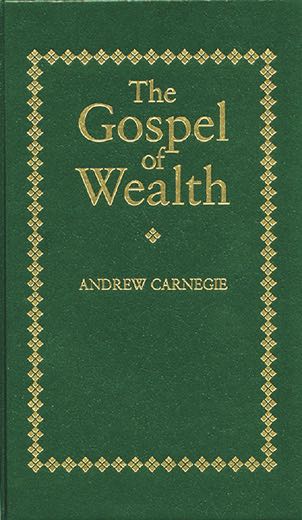The Gospel of Wealth: The Problem of the Administration of Wealth
Reviewed date: 2006 May 4
In 1889, steel mogul Andrew Carnegie published a short essay entitled Wealth, in which he discusses how the wealthy should use their personal fortunes. This essay was republished in the UK under the title The Gospel of Wealth. Carnegie went on to write a series of additional essays, which were collected and published in book form in 1900. Subtitled as The Problem of the Administration of Wealth, his original essay forms the first part of the twelve-chapter book.
Synopsis: The Problem of the Administration of Wealth begins with an analysis of the economic state of the world. Advances in industry had raised the standard of living for the poorest people to a level unknown to kings of earlier ages. But these advances brought another change: a heretofore unseen level of disparity between the rich and the poor.
Carnegie then offers a muddled defense of Capitalism before appealing to pragmatism: Capitalism is the order of the day and one must accept it.
This brings him to his main point: since Capitalism results in a few people amassing huge personal fortunes, what is the proper moral use for those fortunes? It being humanly impossible to spend that much money on oneself, Carnegie identifies three possible courses of action:
- Leave the fortune to heirs
- Bequeath the fortune to charity
- Give the fortune to charity during one's lifetime
The first he finds untenable because a man's heirs are rarely able to put it to good use. Spoiled heirs squander and lose the money; it benefits no one.
Bequeathing one's fortune to charity is little better than leaving it to one's heirs, because there is no way to ensure the money is well spent. A charitable institution is not likely to be a better steward of money than an heir. Nor does bequeathing a fortune to charity deserve any respect, because a man who waits until his death to give to charity is a man who presumably would rather have taken it all with him.
The only proper use of a personal fortune, says Carnegie, is to use it for the public good during one's lifetime. That is the only way to ensure that it is used properly, not wasted. A philanthropist should not spend the money in ways that encourage dependence and actually work to harm the recipients of charity, but rather use it only to fund enterprises that are genuinely helpful to the public.
Coming up: My review of part two, The Best Fields for Philanthropy, in which Carnegie identifies seven specific ways that a conscientious philanthropist can help the public.
